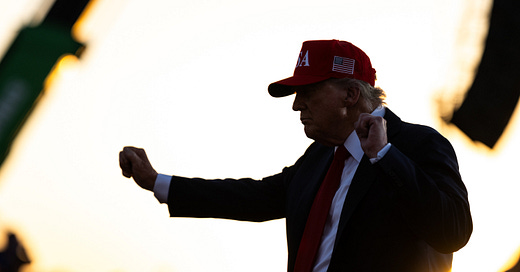The Lie that Feels Like Hope
When any politician promises to save you alone, they’re playing the autocrat’s game.

By Trygve Olson
This is the sixth in an eight-part series on the lessons I’ve learned confronting autocrats over the past twenty-five years. From post-Soviet capitals to American battlegrounds, I’ve seen how authoritarianism grows — and how democracy survives.
Here’s the most challenging part to accept:
Authoritarians win — for a time — because their lies are easier to live with than the truth.
I’ve worked in countries where regimes collapsed economies, jailed dissenters, and destroyed futures. And yet, millions still cheered them on. Why? Because autocrats offer something democracy doesn’t: clarity without complexity, identity without introspection, loyalty without question
The truth is messy. Democracy demands responsibility. Authoritarianism demands only belief.
Autocrats don’t just lie. They simplify. And in a chaotic world, that simplicity becomes all the more seductive.
It doesn’t matter whether they come from the political left or the right — when a leader says “I alone can fix it”, they’re not offering a solution. They’re issuing an ultimatum. They’re not debating policy. They’re constructing a cult of control.
This isn’t new. I’ve seen it in Serbia when Milosevic stoked ethnic nationalism. I’ve seen it in Russia when Putin blamed “the West” for every domestic failure. I’ve seen it in Venezuela, Hungary, and Turkey. And now I see it creeping across democracies where disillusionment makes people vulnerable to manipulation.
These aren’t policy debates. Their identity plays.
And once a political identity fuses with personal identity, the lie becomes sacred. To question it is to ask yourself.
That’s how they win.
Why Authoritarians Manufacture Crisis
Democracies don’t die because people stop caring. They die because people get scared — and they let the wrong person promise them safety.
The media often treats this like a fact-checking exercise. But you can’t counter emotional propaganda with PDFs and corrections. You have to understand the deeper seduction: authoritarian lies don’t persuade — they protect.
They protect people from doubt. From complexity. From the fear that nobody’s really in charge.
Which is why our fight isn’t just about truth. It’s about meaning.
We have to offer an honest narrative, but also a hopeful one. One that doesn’t deny pain, but refuses to exploit it. One that doesn’t pretend democracy is easy, but proves it’s worth the effort.
Because if we keep leaving people alone with their fear, someone — anyone — will always come along with a simple lie to fix it.
And that’s a lie too many are still willing to believe.
Three Things You Can Do When a Politician Plays the ‘I Alone Can Fix It’ Game:
Call It What It Is. Whether it’s from the right or the left, this is not leadership — it’s authoritarian intention signaling. Say it plainly. Name it publicly.
Ask, “Who Benefits?” Push others to think about who gains power from this narrative and who loses agency. Autocrats don’t empower people — they erase them.
Tell a Better Story. Share a moment where cooperation, democratic process, or collective action solved something hard. People need to see the alternative is not chaos — it’s community.
You play the game you are in, not the one you wish you were in. And today’s game demands we confront the autocratic impulse wherever it emerges — not just in the form of one man, but in the form of a mindset. One that says democracy is too slow, too broken, too hard.
It’s not. It’s just honest.
And honesty — unlike autocracy — doesn’t need to be perfect. It just needs to be real.
Trygve Olson is a strategist, pro-democracy fighter and a founding Lincoln Project advisor. He writes the Searching for Hope Substack. Read the original column here.







I am constantly looking for a playbook. The simplicity of your message, not to mirror the simplicity of the messages we are hearing, gives purpose to the people rather than power to the man. Thanks for this.
I need to chisel the three things we can do to push back when an autocrat or his/her allies say, "I alone can fix it', into my brain. Thanks, Trygve